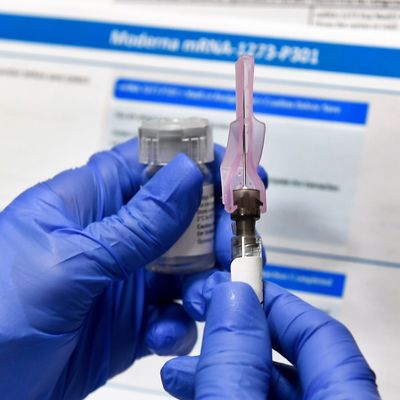
Amid a horrifying surge in COVID-19 cases across the United States, there is more excellent news on the vaccine front.
The pharmaceutical company Moderna announced on Monday that the vaccine it has developed for COVID-19 was 94.5 percent effective in early data from its final-stage clinical trials, an extremely promising number, particularly coming on the heels of Pfizer’s announcement last week that its vaccine was showing similar promise.
The AP has a rundown of how Moderna reached its preliminary conclusion:
Moderna’s vaccine, created with the National Institutes of Health, is being studied in 30,000 volunteers who received either the real vaccination or a dummy shot. On Sunday, an independent monitoring board broke the code to examine 95 infections that were recorded starting two weeks after volunteers’ second dose — and discovered all but five illnesses occurred in participants who got the placebo.
The study is continuing, and Moderna acknowledged the protection rate might change as more COVID-19 infections are detected and added to the calculations. Also, it’s too soon to know how long protection lasts. Both cautions apply to Pfizer’s vaccine as well.
Though Moderna’s data was evaluated by an independent advisory board, it has not been peer-reviewed, so some caution is warranted.
Beyond the top-line numbers, which go well beyond what many observers had expected, Pfizer and Moderna’s data are promising because the method the companies used to develop their vaccines — injecting messenger RNA to stimulate an immune-system response — is similar to that of multiple competitors. This raises the prospect that several safe vaccines may become available to Americans in the coming months, which could help ease looming distribution problems. Also, Moderna’s vaccine can be stored (at least temporarily) at a far warmer temperature than Pfizer’s — -4 degrees Fahrenheit compared to -94 degrees — which makes it far easier to stock in common facilities. Still, there are plenty of logistical challenges. A central one: Pfizer and Moderna’s vaccines require two shots, delivered weeks apart.
Perversely, the current surge in COVID-19 cases around the country helped Moderna collect its data quickly.
Moderna says it will have 20 million doses (enough for 10 million people) ready by the end of the year, and Pfizer and a partner company say they will have 50 million. That will not be enough to vaccinate the general population, but with a ramp-up in production and possibly more vaccine candidates on the way, the reality of doing so may not be too far off. On Monday, Dr. Anthony Fauci projected it could happen by April 2021.
With the country surpassing 11 million confirmed COVID cases and 245,000 deaths in recent days, help can’t come soon enough.






























